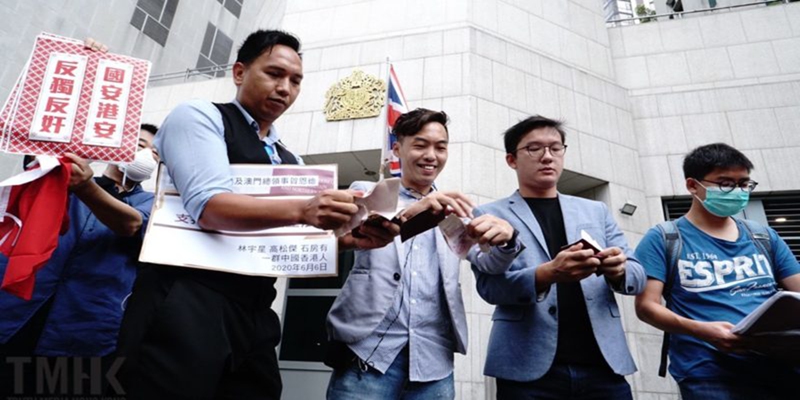
Hong Kong residents tear up BNO passports in front of the consulate to protest against UK interference over the national security law. (Photo: GT)
A draft law on safeguarding national security in the Hong Kong Special Administrative Region (HKSAR) made its debut on Saturday. One could reach the conclusion - as long as we view the draft in a fair and objective manner - that the Chinese central government sincerely hopes to maintain the "one country, two systems" principle; the purpose of enacting the law is to fix national security loopholes in Hong Kong rather than depriving the city of its high degree of autonomy.
The draft law asks for the Chinese central government to establish a commissioner's office for national security affairs in the HKSAR and the HKSAR government will set up a special commission to protect national security in the city. Meanwhile, the draft law underlines respect toward the HKSAR government at the maximum level and Hong Kong's common law. The Chinese central government's direct jurisdiction over national security cases in the city will be very limited.
The protection of human rights and presumption of innocence before judicial conviction will be upheld. The national security law for the HKSAR will not weaken the political rights of Hong Kong people, change the lives of local residents, or influence the implementation of Hong Kong's common law. It just clarifies the responsibility of the central government and the HKSAR government over maintaining national security, drawing a bottom line that all Hongkongers should abide by in terms of national security while establishing a legal mechanism to carry out all these. It is not meant to change operation of the city's function, governance, or people's way of work and life.
Some people still have some concerns, and they may as well observe the future legislative process. But a few people simply want see Hong Kong's complete secession from the central government and bring the city into the arms of the US and the UK. They will definitely continue to distort the contents of the draft with a hostile attitude.
The draft has shown the central government's ability to seek truth from facts. The real need for national security legislation for Hong Kong and the actual situation in Hong Kong are the two most important conditions for drafting this law. Neither Hong Kong radical forces nor external interference has disrupted the lawmakers' thinking. The law to be enacted will not loose its regulation because of resistance, nor will the standard for national security be expanded infinitely for fighting with those forces.
Both the central government and the society of the mainland cherish the "one country, two systems" principle very much, without showing any urge to reinvent the wheel due to their anger toward radical destructive forces in Hong Kong. No matter what these forces or Washington, which stands behind them, will do next, sticking to the "one country, two systems" principle will remain the central government and mainland's rational choices and firm determination. In our view, the "one country, two systems" principle is still the best and only choice. This strategic judgment will not be shaken by short-term turbulence in Hong Kong.
However,"one country, two systems" principle cannot be defined by a handful of extremists in Hong Kong, the US and the West.
Turning Hong Kong into Washington's bridgehead to jeopardize the rise of China, or providing so-called legitimacy for anti-central government acts or the secession of Hong Kong is not "one country, two systems" principle or a high degree of autonomy.
The national security law is precisely aimed at cracking down on fallacies and stressing that Hong Kong is a city of China.
Radical forces in Hong Kong and the US, their main supporter, will continue stirring up trouble for some time. But the drafted national security law for Hong Kong stands firm on morality and justice. Most Hongkongers will understand the goodwill of the central government. Those fighting against the law will be bound to find themselves ever more isolated. They are fighting with no chance of victory.


